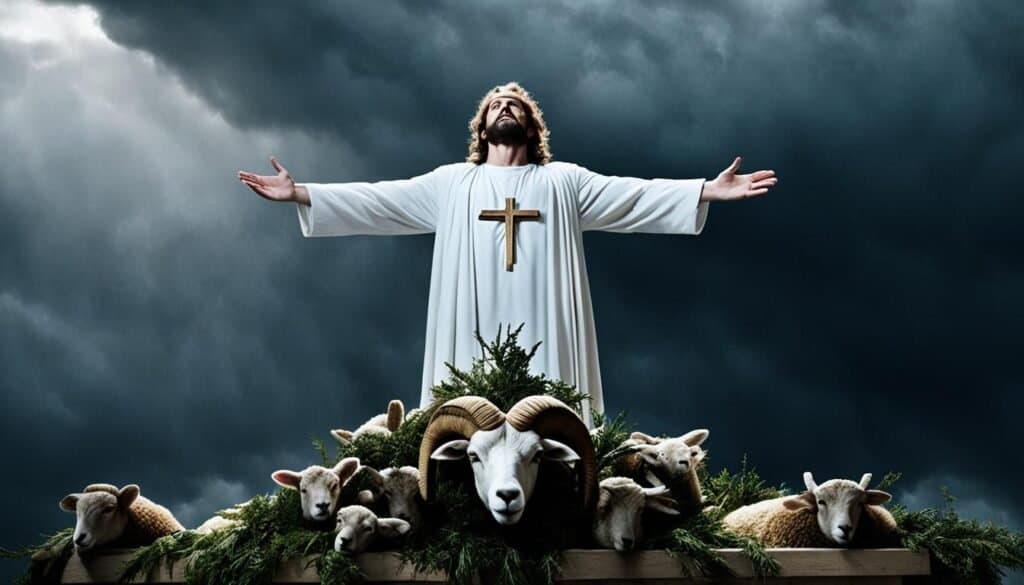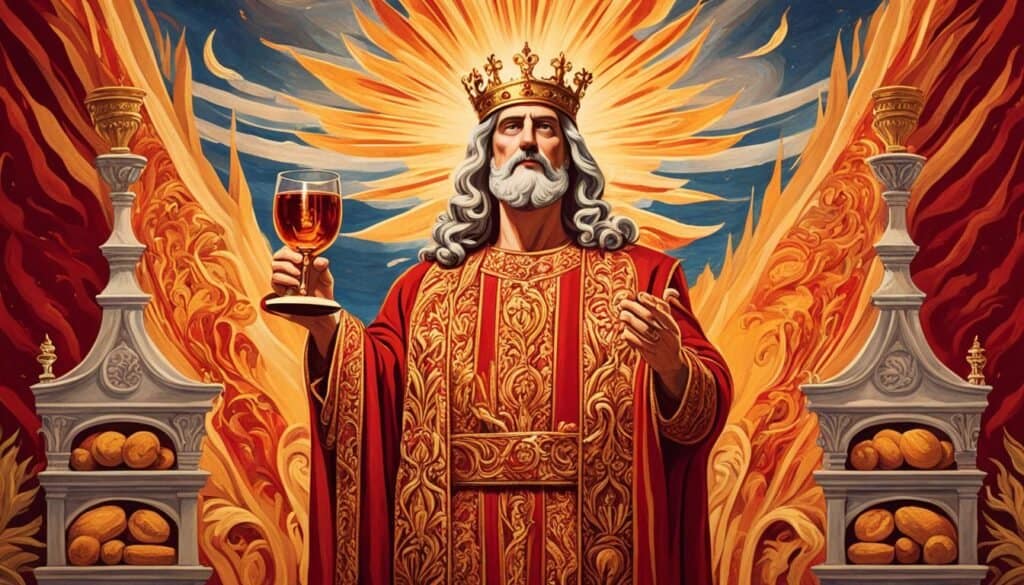In the book of Genesis, many prophecies tell us about a future Messiah. They share hope, promising a Savior who will beat sin and evil. Let’s look at ten key prophecies in Genesis and what they say about the Messiah.
From the seed of the woman to the blessing to Abraham, these prophecies give us a peek into Messiah’s future rule. We’ll dive into the deep meanings and strong messages in these ancient prophecies. Get ready to see the surprising links between Genesis and the coming Messiah.
Key Takeaways:
- Genesis is filled with prophecies about the future Messiah.
- These prophecies offer hope for mankind.
- They reveal the promise of a Savior who will defeat sin and evil.
- The prophecies in Genesis provide insight into the Messianic reign.
- Exploring these prophecies illuminates the extraordinary connections between Genesis and the future Messiah.
The Seed of the Woman (Genesis 3:15)
After Adam and Eve sinned, God gave a special message of hope. In Genesis 3:15, He talks about someone coming from a woman. This person will beat the serpent. This is a sign that the Savior will win against sin and evil, giving everyone a way back to God.
In Genesis 3:15, the struggle between good and bad begins. The “seed of the woman” is about the future Messiah. Born from a woman, he will have the power to beat sin. This shows God’s plan to help us win through the Messiah.
“And I will put enmity between you and the woman, and between your seed and her seed; he shall bruise your head, and you shall bruise his heel.” (Genesis 3:15)
This promise tells of a coming Redeemer. It prepares for one who will fix our relationship with God. It tells us that a Savior will defeat darkness and bring hope.
The seed of the woman, our future Messiah, defeats sin and evil through his death and coming back to life. He gives a chance for everyone to follow God and live forever. This hope from Genesis 3:15 is key to the Bible’s message. It shows God’s love and faith for us all.
This picture shows the heart of the seed of the woman’s message. It symbolizes hope and the win the Messiah will bring. Just like a small seed grows into a big tree, the seed of the woman means a mighty victory over sin and evil. It will fix God’s perfect plan for us.
The Blessing to Abraham (Genesis 12:3)
In Genesis, God gives a blessing to Abraham. This is a very important moment. It has major implications for the world and the Messiah’s coming from Abraham’s family.
God tells Abraham in Genesis 12:3, “I will bless those who bless you, and him who dishonors you I will curse, and in you all the families of the earth shall be blessed.” This is a special promise. It makes Abraham the source of blessings for everyone.
The blessing to Abraham shows God’s faithfulness. It reveals His plan to save the world through the Messiah. This is the ultimate fulfillment of the promise.
Abraham plays a key part in God’s plan for saving people. His blessing hints at the Messiah’s arrival. The Messiah will save and bless people from everywhere.
This blessing includes everyone on Earth. It shows how big the Messiah’s saving work will be. God’s plan is for all people to be part of it.
This promise echoes throughout the Old Testament. It brings hope and expectation for the Messiah. Since the Messiah comes from Abraham, this blessing is crucial.

Thinking about the Genesis 12:3 blessing shows its link to the Messiah. This promise is a forerunner to the Savior’s coming. He will bless and save all nations. This is God’s timeless plan for salvation.
The Scepter of Judah (Genesis 49:10)
Genesis shares an important prophecy about a future leader, the Scepter of Judah. It says in Genesis 49:10 that Judah will keep this symbol of kingship until “Shiloh” comes.
What’s interesting is how this prophecy connects to the coming Messiah. It suggests this future leader will be very powerful.
“The scepter shall not depart from Judah, nor the ruler’s staff from between his feet, until tribute comes to him; and to him shall be the obedience of the peoples.” – Genesis 49:10
This prophecy hints at a leader who will rule as a king. It suggests he will have the power to create God’s kingdom and save people from all over the world.
The Significance of the Scepter
The scepter has always been a symbol of power. Long ago, it showed who had the right to lead. Connecting Judah to the scepter is important because the Messiah would come from there.
The idea that the scepter will remain in Judah until “Shiloh” arrives is key. It implies the coming Messiah’s kingship will be forever. His rule will bring a lasting peace, fairness, and goodness to the earth.
The Messianic Kingship
The Scepter of Judah is central to any discussion about the Messiah. It shows the Messiah as a powerful, royal figure. It highlights his authority to rule and to fulfill God’s plan to save everyone.
We can see this prophecy fulfilled in Jesus Christ. He is from Judah’s line and is known as the Messiah and the King of Kings. His rule is not just over earth but over all of heaven as well.
Let us now explore further prophecies and types in Genesis that reveal the future Messiah’s divine plan and his redemptive work.
The Scepter of Judah in Comparative Perspective
| Prophecy | Meaning | Biblical Passage |
|---|---|---|
| Scepter of Judah | Symbol of messianic kingship and authority | Genesis 49:10 |
| The Stone that Became a Mountain | Representation of the everlasting kingdom of the Messiah | Daniel 2:34-35, 44-45 |
| The Branch from the Stump of Jesse | Promise of a righteous and just ruler from the Davidic lineage | Isaiah 11:1-5, 10 |
Isaac as a Type of Christ (Genesis 22)
The story of Isaac almost being sacrificed in Genesis 22 has deep meaning. It shows how Isaac’s near-sacrifice is a symbol. It foreshadows Christ’s ultimate sacrifice for all of humanity.
God asks Abraham to offer his son Isaac as a burnt offering. Abraham is deeply troubled but prepares to do this as God commands. On their way, Isaac carries the wood on his back.
This is similar to how Christ carried his cross to Calvary.
Just as Isaac willingly gave himself, Christ loved us enough to die for our sins on the cross.
However, God stops this sacrifice from happening. He provides a ram to take Isaac’s place, avoiding his death. This act of a substitute sacrifice heavily hints at the future Messiah’s role.
Isaac’s near-sacrifice offers a glimpse into God’s immense love and his plan for salvation. It hints at the obedience and sacrifice of the coming Messiah. This act would eventually redeem all believers.
Key Takeaways
- Isaac’s near-sacrifice is a powerful preview of Christ’s ultimate sacrifice.
- Isaac bears the wood, much like Christ carried the cross, showing their similarities.
- The ram’s sacrifice in Isaac’s place directly hints at Christ’s substitution for sin.
- This act demonstrates God’s unconditional love and plan for saving mankind.
| Isaac as a Type of Christ | Genesis 22 |
|---|---|
| Symbolism of sacrifice and redemption | It tells of Isaac’s obedience sacrificing, reflecting Christ’s future redemptive sacrifice. |
| Wood as a burden | Isaac carrying wood parallels Christ carrying his cross. |
| Substitutionary sacrifice | God providing a ram instead of Isaac foretells Christ as the ultimate sin substitute. |
| God’s love and salvation | Isaac nearly being sacrificed reveals God’s plan and love for saving us. |
Examining Genesis 22 shows how Isaac was a figure of Christ. It deepens our grasp of Christ’s sacrificial role. And what his sacrifice means for our redemption. This story draws attention to God’s unchanging love and his plan to save us.

Melchizedek as a Type of Christ (Genesis 14:18-20)
In Genesis, we meet Melchizedek, a figure with deep Messianic meanings. Melchizedek appears in Genesis 14:18-20 to bless Abraham, the father of faith.

Melchizedek is both a king and a priest, a unique role that parallels Christ. Like Jesus is the King and High Priest, Melchizedek shows this dual nature.
“Melchizedek king of Salem brought out bread and wine. He was priest of God Most High. And he blessed him and said, ‘Blessed be Abram by God Most High, Possessor of heaven and earth; and blessed be God Most High, who has delivered your enemies into your hand!'”
This meeting highlights Jesus’ Messiah authority as both priest and king. Melchizedek’s blessing resembles the blessings Christ brings through his redemption.
The name “Melchizedek” is very meaningful. It combines “melech,” which means “king,” and “tzedek,” meaning “righteousness” or “justice.” Jesus truly is the righteous King who offers justice and save.
Exploring Genesis reveals prophecies pointing to the future Messiah. Melchizedek in Genesis 14:18-20 shows the priestly and kingly sides of the Messiah.
| Melchizedek as a Type of Christ | Relevance |
|---|---|
| Melchizedek’s dual role as a king and priest | Foreshadows Christ’s dual role as the King of kings and the High Priest |
| Melchizedek’s blessing upon Abraham | Echoes the future blessings through Christ’s redemptive work |
| The meaning of Melchizedek’s name | Highlights Jesus as the righteous King who brings justice and salvation |
Let’s keep exploring Genesis’s prophecies and typology. They show God’s detailed plan fulfilled through the Messiah.
The Blessing of Judah (Genesis 49:8-12)
Jacob gave a special blessing to Judah, saying his brothers would honor him. He also said Judah would have power over his enemies. This points to Christ’s future victory and leadership.
Judah’s Blessing
Jacob’s blessing on Judah is key to understanding the coming Messiah. Genesis 49:8-12 tells us Jacob’s vision for Judah. He spoke of victory and being praised by his kin. This echoes the triumph and leadership of Jesus Christ, the Messiah.
Leadership of Christ
Judah’s foretold leadership hints at Christ ruling as the promised Messiah. In a similar way, Christ would gain authority over spiritual foes. This includes power over sin.
Christ’s advance to this leadership showed in His teachings and miracles. His ultimate act was dying to save humanity from sin.
Victory and Triumph
Jacob’s words about Judah prevailingly signify the Messiah’s work. Jesus, the Lion of Judah, overcame spiritual darkness. He established a kingdom of righteousness.
Through His resurrection, Jesus achieved a lasting victory. This victory offers eternal life and freedom from sin to believers.
Messianic Prophecy Fulfilled
Jacob’s blessing turns into a powerful prophecy for Christ. It highlights Jesus’ role as Savior. Jesus fulfills the hope of all Messianic promises.
Jesus’ victory, leadership, and faithfulness fulfill the promises. It brings eternal blessings to all who believe in Him.

| Blessing of Judah (Genesis 49:8-12) |
|---|
| Brothers will praise him |
| Hand on the neck of enemies |
| Leadership of Christ |
| Victory and triumph over sin and evil |
| Fulfillment in Jesus Christ |
The Star Out of Jacob (Genesis Numbers 24:17)
In the Bible, an intriguing prophecy is in Numbers but starts in Genesis. Balaam, a seer, shared that a “star” would come from Jacob’s line. This “star” represents a royal figure from Israel, the awaited Messiah.
“I see him, but not now; I behold him, but not near. A star shall come forth from Jacob, a scepter shall rise out of Israel…”
This prophecy meant a lot to the Israelites and others waiting for God’s promise. The star symbolizes hope, a sign that a royal figure will come. This figure will bring divine rule and save the people.
The prophecy’s use of “star” links to power and kingship represented by stars in the past. It hints that the Messiah will have both earthly and heavenly power.
Mentioning “Jacob” is key in this prophecy. Jacob (Israel) was the father of the twelve tribes of Israel. So, connecting the star to Jacob highlights the Messiah’s link to God’s chosen people.
From Genesis to Numbers, we see how these prophecies are connected. The “star out of Jacob” prediction in Numbers is rooted in God’s plans as early as Genesis. It shows God’s careful plan for saving humanity.
Israel looks forward to the Messiah. They believe he will bring back their nation, set up a just kingdom, and save everyone.
| Prophecy | Reference |
|---|---|
| The Seed of the Woman | Genesis 3:15 |
| The Blessing to Abraham | Genesis 12:3 |
| The Scepter of Judah | Genesis 49:10 |
| Isaac as a Type of Christ | Genesis 22 |
| Melchizedek as a Type of Christ | Genesis 14:18-20 |
| The Blessing of Judah | Genesis 49:8-12 |
| Blessing to Isaac | Genesis 26:4 |
| The Dream of Joseph | Genesis 37:5-11 |
Blessing to Isaac (Genesis 26:4)
Isaac, Abraham’s son, receives a special covenant from God. It doesn’t just benefit his family but all people. In Genesis 26:4, God promises, “I will make your descendants as many as the stars. They will inherit these lands. Through your descendants, everyone in the world will be blessed.” This shows that the promise of a savior extends to all nations, offering blessings to everyone.
This blessing to Isaac is key to the Messianic promise. It shows how important Isaac’s family is in God’s big plan. The Messiah’s coming and the offer of salvation are tied to Isaac’s descendants. They showcase God’s faithfulness to fulfill his promises through generations.
“…And in your offspring, all the nations of the earth shall be blessed.”
Isaac’s blessing points to a time when the Messiah will save more than just Abraham’s family. His grace will reach everyone, showing God’s love is for all. It reveals God’s plan to save everyone, no matter their background or where they come from.
The Universal Scope of the Messianic Promise
Isaac’s blessing highlights God’s big picture plan for our world’s rescue. It touches every age and culture, offering hope to all people. The Messiah, linked to Abraham and Isaac, fulfills a promise to bless the entire world. It illustrates that everyone can find hope and renewal in this divine blessing, without exception.
Through the Messianic promise, we see God’s far-reaching plan. It includes everyone, from every part of the world. The promise is an open invitation to join in the blessings and grace brought by the Messiah.
| Key Points | Relevance |
|---|---|
| Continuation of the Messianic promise | Highlights the interconnectedness of God’s plan for salvation |
| Universal scope of the blessing | Emphasizes the all-inclusive nature of the Messiah’s redemptive work |
| Divine affirmation of Isaac’s lineage | Establishes the importance of Isaac’s descendants in the fulfillment of the Messianic promise |
The Dream of Joseph (Genesis 37:5-11)
In Genesis, we find a story about Joseph having a dream. This dream is about him and his brothers working in a field. In the dream, his sheaf stands up, and his brothers’ sheaves bow to it. He tells his family about this strange dream.
“Listen to this dream that I have dreamed: we were binding sheaves in the field. My sheaf arose and stood upright. Your sheaves gathered around it and bowed down.”
This dream is key in the Messianic prophecy. It shows Joseph’s family bowing to him, which represents the whole earth acknowledging the Messiah. The imagery hints at a time when all will accept the Messiah’s rule.
Joseph’s dream symbolizes a deep hope for most people. It’s the hope for a Savior who brings everyone together and saves them. This points to the grand story of God saving humanity, starting with Genesis and leading to the ultimate savior, Jesus Christ.
The Messiah Recognized by All Nations
Joseph’s dream in Genesis 37:5-11 underlines a major theme. It talks about the Messiah being known by all places and cultures. The story suggests the Messiah’s worldwide impact and the unity he brings regardless of differences.
This part of Genesis shares a hope for a new beginning. A time when everything broken will be fixed. It speaks of God’s promise of rescue for the world and highlights His constant care since the beginning of time.
The prophecies in Genesis, like Joseph’s dream, show God’s big picture. They lead us to anticipate the Messiah’s arrival. This story points to Jesus, who will be celebrated everywhere for his rule.
The Survival of Judah (Genesis 43:8-9)
The book of Genesis shares a story that points to Jesus as our savior. It’s about Judah’s survival in a tough time.
In Genesis 43:8-9, Joseph’s brothers go to Egypt for food. They’re tested to see if they’ve changed. Joseph wants to know if they’ll stand up for their youngest brother, Benjamin.
Judah steps up and makes a heartfelt promise for Benjamin’s safety. He offers himself to Joseph as a pledge. This moment shows Judah’s growth and hints at Jesus’ future role as our savior.
Judah’s promise showed he cared more about his family than himself. Similarly, Jesus gave his life for us. Through his actions, we are offered salvation and a path back to God.
Genesis 43:8-9 underlines God’s detailed plan for our rescue. It’s a preview of how Jesus would later save us. We should be glad for this proof of God’s love and the promise of salvation in Jesus.
Affiliate Disclosure: "As an Amazon Associate I earn from qualifying purchases made from links in this post. We are a participant in the Amazon Services LLC Associates Program, an affiliate advertising program designed to provide a means for us to earn fees by linking to Amazon.com."

